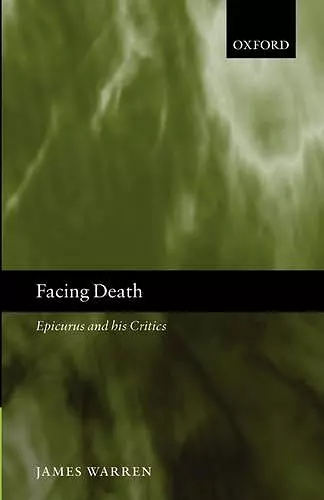Facing Death
Epicurus and his Critics
Format:Hardback
Publisher:Oxford University Press
Published:17th Jun '04
Currently unavailable, and unfortunately no date known when it will be back
This hardback is available in another edition too:
- Paperback£61.00(9780199297696)

The ancient philosophical school of Epicureanism tried to argue that death is 'nothing to us'. Were they right? James Warren provides a comprehensive study and articulation of the interlocking arguments against the fear of death found not only in the writings of Epicurus himself, but also in Lucretius' poem De rerum natura and in Philodemus' work De morte. These arguments are central to the Epicurean project of providing ataraxia (freedom from anxiety) and therefore central to an understanding of Epicureanism as a whole. They also offer significant resources for modern discussions of the value of death - one which stands at the intersection of metaphysics and ethics. If death is the end of the subject, and the subject can not be benefited nor harmed after death, is it reasonable nevertheless to fear the ceasing-to-be? If the Epicureans are not right to claim that the dead can neither be benefited nor harmed, what alternative models might be offered for understanding the harm done by death and do these alternatives suffer from any further difficulties? The discussion involves consideration of both ethical and metaphysical topics since it requires analysis not only of the nature of a good life but also the nature of personal identity and time. A number of modern philosophers have offered criticisms or defences of the Epicureans' views. Warren explores and evaluates these in the light of a systematic and detailed study of the precise form and intention of the Epicureans' original arguments. Warren argues that the Epicureans also were interested in showing that mortality is not to be regretted and that premature death is not to be feared. Their arguments for these conclusions are to be found in their positive conception of the nature of a good and complete life, which divorce the completeness of a life as far as possible from considerations of its duration. Later chapters investigate the nature of a life lived without the fear of death and pose serious problems for the Epicureans being able to allow any concern for the post mortem future and being able to offer a positive reason for prolonging a life which is already complete in their terms.
This is an impressive book, blending scholarly resource with sharp discussion, always to the point, always leaving the reader more informed...A must...His conclusion is superb in its precision, and he leaves us with the thought that Epicureanism is no 'quick fix', that, as Antiochus must work on the rational therapy offered by his philosophical counsellor in order to pass the message to his soul, so must we all - a better text for philosophical counselling surely could not be found. * Gerald Rochelle, Practical Philosophy *
...lucidly written... * Y. Michael Barilan, Theoretical Medicine and Bioethics *
This is a very fine book. It blends historical and textual analysis with philosophical discussion in a seamless, illuminating way ... The book is written in a sophisticated and yet clear, uncluttered, and even elegant way. It is thus of potential interest to a wider audience of thoughtful and reflective people interested in this fascinating set of issues. * John Martin Fischer, The Classical Review *
...those who dedicate their research and teaching to questions at the end of life would be well served by this book. * Theoretical Medicine and Bioethics, vol. 28 *
This book is what Epicureans and their critics, both hostile and sympathetic, have been waiting for. It is rare, indeed, to find a work that shows both a solid grasp of ancient texts, their proper philological interpretation and appreciation, and is at the same time clearly cognizant of the contemporary philosophical debates on the issues originally raised by our Greek sources. This is such a book and its publication will prove to be a milestone. * Lawrence Jost, Notre Dame Philosophical Reviews *
Readers of [Warren's] book will probably not be converted to fully-fledged Epicureanism, but they will find themselves in excellent philosophical company and stimulated to look at death, and therefore life, with fresh eyes. All in all, James Warren has written a scholarly monograph that admirably transcends the normal limitations of that genre. * A. A. Long, Times Literary Supplement *
[Warren] is the first writer to provide a comprehensive analysis of Epicurean reflections on death, with full reference both to their original contexts and to their ethical and metaphysical underpinnings. * A. A. Long, Times Literary Supplement *
Warren offers a sophisticated, nuanced and highly persuasive defense of the Epicurean position that "death is nothing to us". [An] excellent book * James Stacey Taylor, Ethic Theory Moral Practice *
ISBN: 9780199252893
Dimensions: 224mm x 146mm x 19mm
Weight: 418g
250 pages